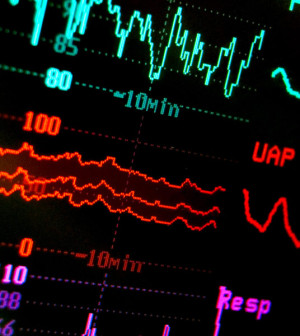- Double Mastectomy May Offer No Survival Benefit to Women With Breast Cancer
- Toxic Lead Found in Cinnamon Product, FDA Says
- Certain Abbott Blood Sugar Monitors May Give Incorrect Readings
- Athletes Can Expect High Ozone, Pollen Counts for Paris Olympics
- Fake Oxycontin Pills Widespread and Potentially Deadly: Report
- Shingles Vaccine Could Lower Dementia Risk
- Your Odds for Accidental Gun Death Rise Greatly in Certain States
- Kids From Poorer Families Less Likely to Survive Cancer
- Tough Workouts Won’t Trigger Cardiac Arrest in Folks With Long QT Syndrome
- At-Home Colon Cancer Test Can Save Lives
Vitamin B Supplements May Guard Against Stroke


WEDNESDAY, Sept. 18Taking vitamin B supplements may help reduce your risk of stroke, a new review shows.
Previous research has yielded conflicting findings about whether taking vitamin B supplements affects the risk of stroke and heart attack. Some studies have concluded that taking vitamin B supplements may actually increase the risk, according to the review authors.
They analyzed the findings of 14 clinical trials that included a total of nearly 55,000 people. All of the trials compared vitamin B supplement use with a placebo or very low-dose vitamin B.
The participants were followed for a minimum of six months. There were a total of nearly 2,500 strokes among the participants in the studies, all of which showed some benefit of taking vitamin B.
Overall, vitamin B supplements reduced the risk of stroke by 7 percent, but did not appear to reduce the severity of strokes or the risk of death from stroke, according to the review, which was published in the Sept. 18 online issue of the journal Neurology.
The researchers found that folic acid, a supplemental form of folate (B9) that is common in fortified cereals, appeared to reduce the beneficial effect of vitamin B. They also found that vitamin B12 had no effect on stroke risk.
“Based on our results, the ability of vitamin B to reduce stroke risk may be influenced by a number of other factors, such as the body’s absorption rate, the amount of folic acid or vitamin B12 concentration in the blood, and whether a person has kidney disease or high blood pressure,” review author Xu Yuming, of Zhengzhou University in China, said in a journal news release.
“Before you begin taking any supplements, you should always talk to your doctor,” Yuming added.
One expert agreed, noting that strokes can be caused by many varying factors.
“Ischemic strokes can have many different causes, the most common being hypertension, diabetes, high cholesterol, smoking and obesity,” said Dr. Rafael Alexander Ortiz, director of neuro-endovascular surgery and stroke at Lenox Hill Hospital in New York City. “There is a group of patients that may suffer a stroke due to deficiency of vitamins and enzymes. It is appropriate to perform a comprehensive work-up, including [for] vitamin deficiencies, in patients that have suffered a stroke.”
Another expert said the findings are important.
“[The report] identifies a substance which is readily available and has been demonstrated to have a positive effect in stroke risk reduction in certain population subgroups,” said Dr. Albert Favate, director of the Comprehensive Stroke Center at NYU Langone Medical Center in New York City. “The article also reflects the increased public thirst for dietary prevention of stroke.”
More information
The U.S. National Library of Health has more about vitamin B.
Source: HealthDay
Copyright © 2024 HealthDay. All rights reserved.










